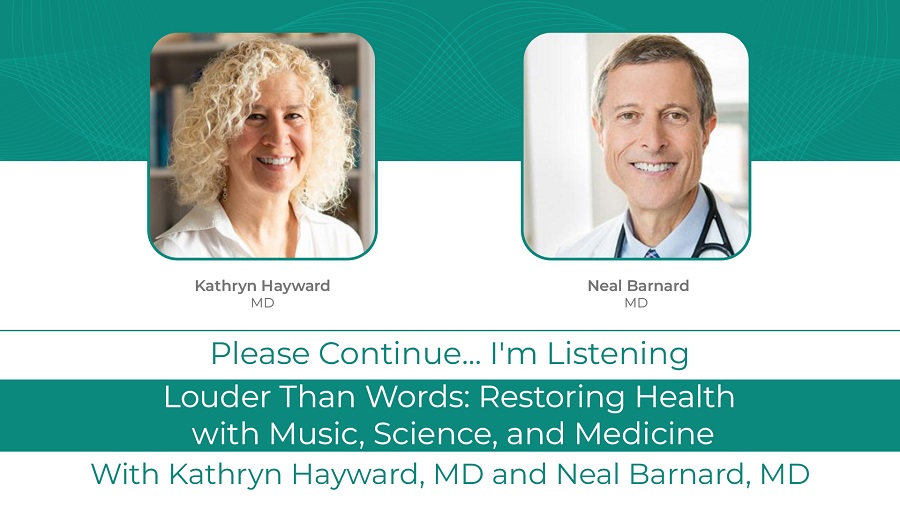Podcast With Neal Barnard, MD: Louder Than Words:
We Recommend That You
Listen to the conversation between Kathryn Hayward, MD and Neal Barnard, MD, FACC, who is an Adjunct Professor of Medicine at the George Washington University School of Medicine in Washington, DC, and President of the Physicians Committee for Responsible Medicine.
Dr. Barnard has led numerous research studies investigating the effects of diet on diabetes, body weight, hormonal symptoms, and chronic pain, including a groundbreaking study of dietary interventions in type 2 diabetes, funded by the National Institutes of Health, that paved the way for viewing type 2 diabetes as a potentially reversible condition for many patients.
“Nutrition is embarrassingly neglected in medical school. We treat diabetes as if it is a Metformin deficiency.”
-Neal Barnard, MD
Course Description
What do medical students NOT learn in medical school?
Dr. Barnard has authored more than 100 scientific publications and 20 books for medical and lay readers, and is the editor in chief of the Nutrition Guide for Clinicians, a textbook made available to all U.S. medical students
“You can easily miss the message in medical school that you are a whole lot better off without animal products. Cholesterol is not found in plants. It’s in meats and dairy products. If you read between the lines, it tells you what you might want to choose for lunch."
-Neal Barnard, MD
As president of the Physicians Committee for Responsible Medicine, Dr. Barnard leads programs advocating for preventive medicine, good nutrition, and higher ethical standards in research. His research contributed to the acceptance of plant-based diets in the Dietary Guidelines for Americans.
In 2015, he was named a Fellow of the American College of Cardiology. In 2016, he founded the Barnard Medical Center in Washington, DC, as a model for making nutrition a routine part of all medical care.
“I would identify meat with death, which obviously of course it is. It’s not a very long journey from there to thinking about the compassionate side of it and what does it take to turn a majestic cow into lunch.”
-Neal Barnard, MD
As a child in Fargo, North Dakota, Barnard studied piano, cello, and guitar, and took his love of music with him to Washington, DC, where, as a medical student and resident, he was a fixture in the Washington, DC, music scene. He follows in the tradition of other scientists and physicians whose scientific innovations are complemented by explorations in music. In CarbonWorks, Barnard’s collaborators include an array of talented musicians from the U.S., Italy, Germany, and Vietnam.
“I’m a “stone soup” composer. “Here’s my stuff” and other people bring their radishes and cabbages and potatoes and then it really becomes good.”
-Neal Barnard, MD
Kathryn and Neal’s conversation ranges from science to medicine to music to compassion and kindness Here are some of the themes that will engage you as you listen to their podcast:
- How do we develop compassion for all species on Earth?
- Who are the musicians in Carbonworks?
- How did the influenza pandemic of 1918 show us what would inevitably happen with future pandemics, including COVID?
- How did Neal transform from a duck-shooting North Dakota kid to who he is today?
- How does Neal describe the power of collaboration?
- How does Neal keep going when so many people are not listening
- How does the gene for dopamine receptors influence why we eat the way that we do?
- How does food help menopause symptoms? PMS symptoms? Fertility?
“I think people want help, they want to connect, but they are also afraid. It’s a big part of the human experience to want connectedness and to be very much afraid of it.”
-Neal Barnard, MD
Facilitators
